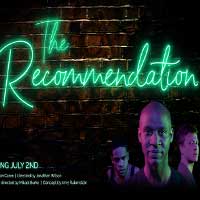
 [rating=5]Powerful! Intense! Profoundly entertaining! Delightfully thought-provoking!
[rating=5]Powerful! Intense! Profoundly entertaining! Delightfully thought-provoking!
With astonishingly wonderful actors, brilliant direction by Jonathan Wilson, and a superior script by Jonathan Caren, “The Recommendation” is a dense, finely-crafted production that details the culture clashes among three men who come from different walks of life and who try to achieve some measure of success in contemporary American society.
The story is narrated in part by Iskinder Iodouku (Michael Aaron Pogue), a student whose father is Ethiopian and whose mother is a white American. Izzy describes how he meets his freshman-year “whiter than white” (read rich and Jewish) roommate Aaron Feldman (Julian Hester) at Brown University and goes through the journey that their friendship takes them. Both separately make the acquaintance of Dwight Barnes (Brian Keys), an African-American inmate at the county jail. While all three characters may be viewed as stereotypes, the forceful collision of their lives allows the playwright to flesh out his insights of what it means to attain opportunities for education, career, income, and success in our culture.
The first hour is comedic. It shows how Izzy wants to make a difference in the world and become a public defender. But under Aaron’s influence, he starts living the high life and realizes that he can use his anticipated law degree to improve his income and social status. With recommendations from Aaron’s dad to UCLA law school and later a prestigious firm, Izzy does very well for himself and can afford to marry and raise a family. In contrast, Aaron’s choice of college major is film. From the very beginning, he minimizes his potential for success in his intended career path by saying more than once, “The script really sucks, and I haven’t written it yet.” Is this go-to line a foreshadowing of the direction that his life will take? (Or the direction of today’s production?)
The second hour sharply turns into tragedy. While in jail, Aaron confesses his unreported fatal traffic accident to Dwight and wants to do everything possible to get out of serving time in prison. He is scared! Despite Aaron’s admission (or maybe because of it), Dwight does him a huge favor to get him out of the lockup. He knows that Aaron comes from a privileged background and thus he expects in return a forthcoming recommendation so that he can advance himself. The problem lies when Aaron has no intention of fulfilling his promise. Aaron cannot envision a man whom he perceives as a career criminal getting a head start anywhere. Later, it bothers Aaron to no end when Izzy helps out Dwight with his court appeal and then gives him a job recommendation to become a maintenance man at a health club. Aaron can’t even stand seeing Dwight working in a low status job! Subsequently Izzy loses his position at the law firm, because, while his bosses like the content of his legal appeals, they don’t like the fact that he has vouched for the “wrong person.”
Izzy is removed enough from the wealthy and privileged white man and the indigent and street-smart black man so that he is in a position to simultaneously observe the all sides of the cultural divide between them. Shaped by his unique perspective of having a foot in both worlds but no firm grounding in either, Izzy is thus a conflicted and complicated character. He witnesses the social order as being relatively static despite the mythology of the American Dream, where people are supposed to rise in the occupational hierarchy to the level of their capability through ambition and hard work. Depending on one’s perspective, the glitch in the whole system or the oil lubricating it all is that of the almighty recommendation.
The recommendation is the common denominator of the corporate world that greatly affects one’s life chances. It is the priceless crowning jewel of what conventional society values, where somebody already in some position of power or influence can vouch for you—and state that you have the right qualifications to be accepted into college or hired into a job. Without a recommendation and the right kind of references, your ambitions could be dashed and your future radically altered, despite the fact that you may be bright, talented, eager to learn, and of good character. In a fair contest, the recommender would highlight a candidate’s ability and training objectively. But in Aaron’s world, the recommendation is more subjective: It is part and parcel of a system that favors the privileged class and grants favors to those who aspire to it.
There are clearly established rules of the game; and while Aaron, Izzy, and Dwight understand what they are, it becomes evident that not everyone has the same advantages to scale the opportunity ladder. “The only way to play by your rules is to tell them what you’ve done,” says Dwight, referring to the process of getting paid employment through resumes, references, and previous work product. His character highlights the reality that recommendations are especially necessary when you have been denied opportunities in the past and don’t have a track record at all—or at least, not one in your field. For Dwight, life is a crapshoot, like drawing a card in a board game that directs a player to move two spaces forward or ten spaces back or to go to jail or get out of jail free. For Aaron, who has the blessings of white skin and a wealthy and influential father, the die is cast for him to win at the game of Monopoly, no matter what he does with his life.
Artistic Director Amy Rubenstein has done an exquisite job of reconceptualizing Jonathan Caren’s script, adapted for this production at the Windy City Playhouse. This is immersive theater brought to life, with the audience playing an integral part in the performance. Be prepared to be guided through a series of rooms, interact with your surroundings, witness the characters’ lives up close, and participate in the show.
In fact, when you first walk into the theater lobby, you are presented with a letter of acceptance to Brown University (which also serves as your program guide). So be prepared to become part of the Class of 2011 and engage with the actors. Just note that the name Brown University carries with it many implications. The most important of these is that Brown is a very highly selective, highly competitive Ivy League institution. In this production, it is clearly suggested that some amount of brown-nosing takes place in order to be admitted to the freshman class. Another nuance is that students of color (i.e., brown and black students) are to be accepted as equals with their white counterparts, something that might not have occurred among prior generations of wealthy alumni.
Set design and props are well done, as are the costumes. Especially notable are the numerous and quick costume changes. Clever, razor-sharp dialogue evolves into physical sparring; kudos to Wesley Daniel, the fight choreographer. Special recognition must be given to Jason Lynch, the lighting designer, as the quality of lighting in each scene is extraordinarily effective and realistic.
Note that alcohol is served as part of the performance. You can request non-alcoholic beverages if you wish, or you can refuse them entirely. A snack is also served, again if you choose to accept it.
Speaking of snacks, I enjoyed the rap song about the combination of Pizza Hut and Taco Bell. That too is an idiosyncratic mix that is part and parcel of America today: fast food available to the masses within the framework of corporate culture. It also gets you thinking about eating something between Acts One and Two. (FYI: Taco Bell is only two blocks away—on California Avenue!)
In sum, “The Recommendation” is a compelling narrative, steered by strong acting, that demonstrates the extent to which social mobility hinges on the people who choose to recommend you for future opportunities. At the end, Izzy states, “It’s not who you know but who really knows you.” Yet the audience is left with the uneasy feeling: Isn’t the situation actually the reverse?
“The Recommendation” is currently playing at the Windy City Playhouse, 3014 W. Irving Park Avenue, in Chicago.
 The performance schedule is as follows:
The performance schedule is as follows:
Wednesdays and Thursdays at 7:30 p.m.
Fridays at 8 p.m.
Saturdays at 4 p.m. and 8 p.m.
Sundays at 2 p.m. and 6 p.m.
Tickets ($80-$100) are now on sale through September 22. Audience size is limited to 30 people per performance to maintain the intimacy of the setting.
For tickets/reservations call Windy City Playhouse at 773-891-8985 or visit www.windycityplayhouse.com
to see what others are saying, visit www.theatreinchicago.com, go to Review Round-Up and click at “The Recommendation”.
Paid parking is available on Irving Park Road. Street parking is available on Sacramento and other side streets.






More Stories
“The Firebugs” reviewed by Julia W. Rath
“The Book of Grace” Al Bresloff with another from Paul LIsnek
“The Last Five Years” MILWAUKEE